Biodegradable Waste Collection
Did you know that every year more than 120 kg of kitchen bio-waste per person is generated in Bratislava? If we collect this type of waste separately, it can be processed and returned to the soil as valuable compost.
The Waste Act requires the Capital City to ensure the sorting of bio-waste by 2023 at the latest. We started in Lamač, in 2022 we are implementing it in other city districts, the last ones will be connected at the beginning of 2023.
The aim of the measure is to reduce, ideally to eliminate, kitchen bio-waste from mixed municipal waste.
- With landfilling practised on 80% of the territory of Slovakia, bio-waste is the biggest producer of greenhouse gases and polluter of surface and groundwaters, soil and air.
- Residents of approximately 90 households in a block of flats could thus sort enough kitchen bio-waste in a year to enrich one hectare of land.
- Such a green area can grow approximately 40-70 tonnes of carrots or 30 tonnes of melons.
- By sorting kitchen bio-waste, we reduce the volume of artificial fertilisers on our fields and support the development of a circular economy.
Join the collection of kitchen bio-waste and help protect our environment by reducing the volume of mixed waste in our capital city.
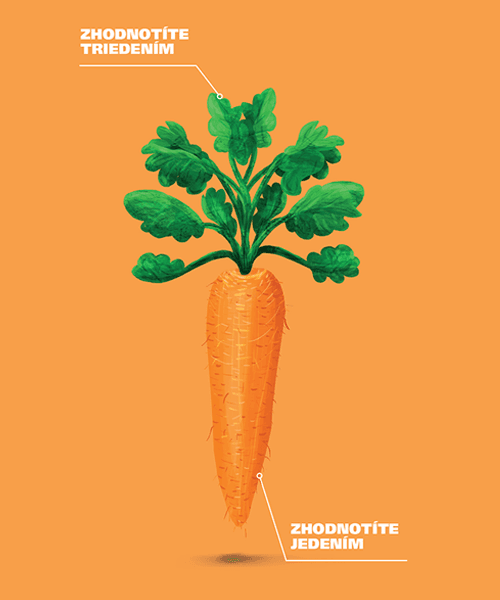
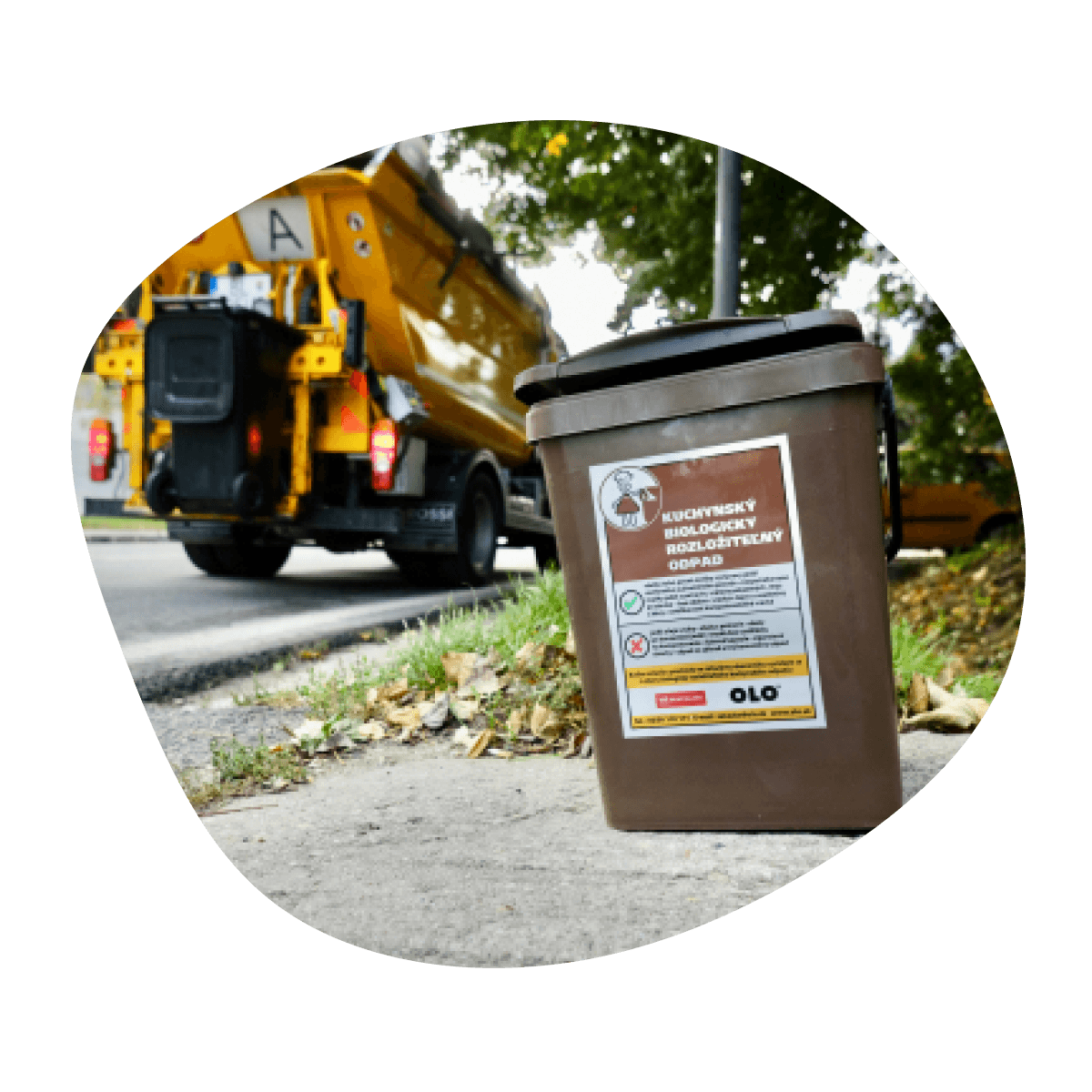
Results so far
We have already introduced the collection of kitchen biowaste in the Lamač, Záhorská Bystrica, Karlova Ves and Dúbravka districts. The average participation rate is 85% for family houses and 95% for apartment buildings. From the beginning of the project until mid-April, 150 tons of kitchen waste was collected.
Residents have the opportunity to experience that the amount of their mixed municipal waste is decreasing due to the sorting of kitchen waste.
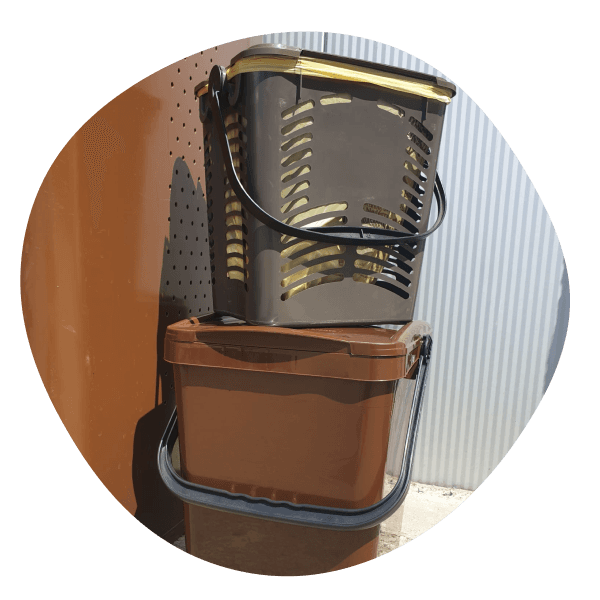
Information on the management of kitchen biodegradable waste
For households in residential blocks Residents of such blocks will sort kitchen bio-waste into a compostable bag sited in a 10-litre kitchen bin. Once the bag is full, it will be sealed and taken to a 120 l or 240 l brown collection container (depending on the number of residents in the block of flats) marked with a sticker "kitchen biodegradable waste", which will be placed near to your block of flats at the usual location of the container stand.
For households in family houses Residents of family houses will sort kitchen bio-waste into a compostable bag sited in a 10-litre kitchen bin. When the bag is full, they will seal it and place it in a 20-litre brown collection container labelled 'kitchen biodegradable waste'. This collection container will be located at the usual mixed waste collection point by 7:00 a.m. on the day of collection.
What does and does not belong in compostable bags for kitchen bio-waste?
Warning: Compostable bags must not be stored in humid and warm environments, under extreme conditions and in direct sunlight. They may degrade or decompose.
After filling the kitchen basket, close the compostable bag that is in the 10 l kitchen basket and take it out to the brown collection container marked with the label KITCHEN BIODEGRADABLE WASTE.
Information on the collection of household kitchen waste
- The collection of biodegradable kitchen waste will be distributed as follows from 2022: From March to November, the collection will be twice a week. From December to February the collection will be once a week.
- On the day of collection, 20 litre collection containers from family houses should be placed at the usual collection point for mixed waste by 7:00 a.m.
- Only use the collection bins delivered by us and the certified compostable bags you have been given for 12 months in a quantity of 150 (2 to 3 bags per week).
- The cost of collecting kitchen bio-waste from residential blocks and family houses forms part of the local charge for municipal waste and minor construction waste.
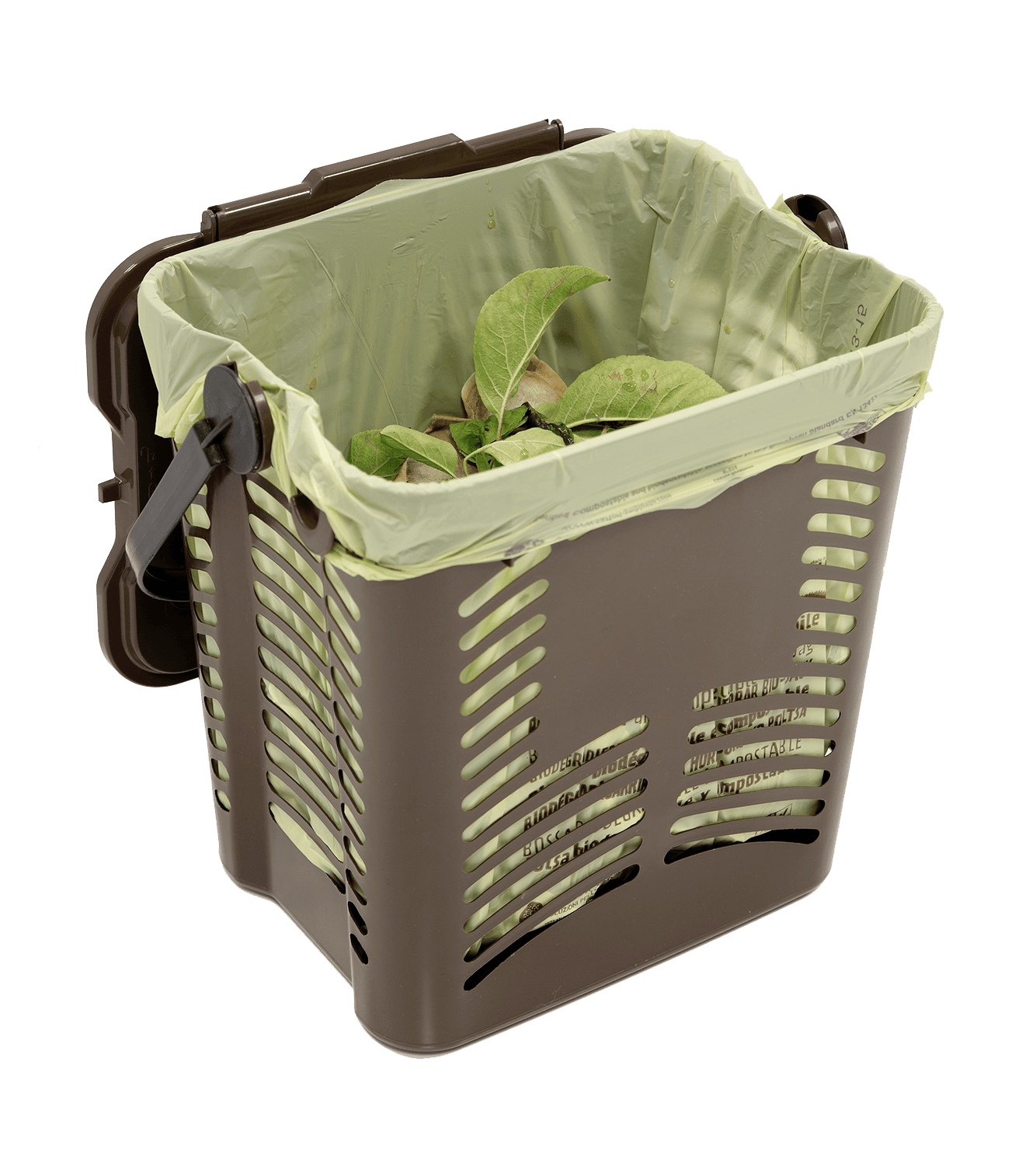
How to combine kitchen bio-waste collection and home composting?
The two methods effectively complement each other to ensure that as much food waste as possible is recycled. Fruit and vegetable waste can be composted at home, as can flowers, wood chips, sawdust, cut grass, small pieces of branches, leaves and weeds.
You can put meat, fish and dairy products along with any cooked food in your kitchen waste collection, but you should not compost them at home. An ordinary home composter sited in the garden cannot fully process them.
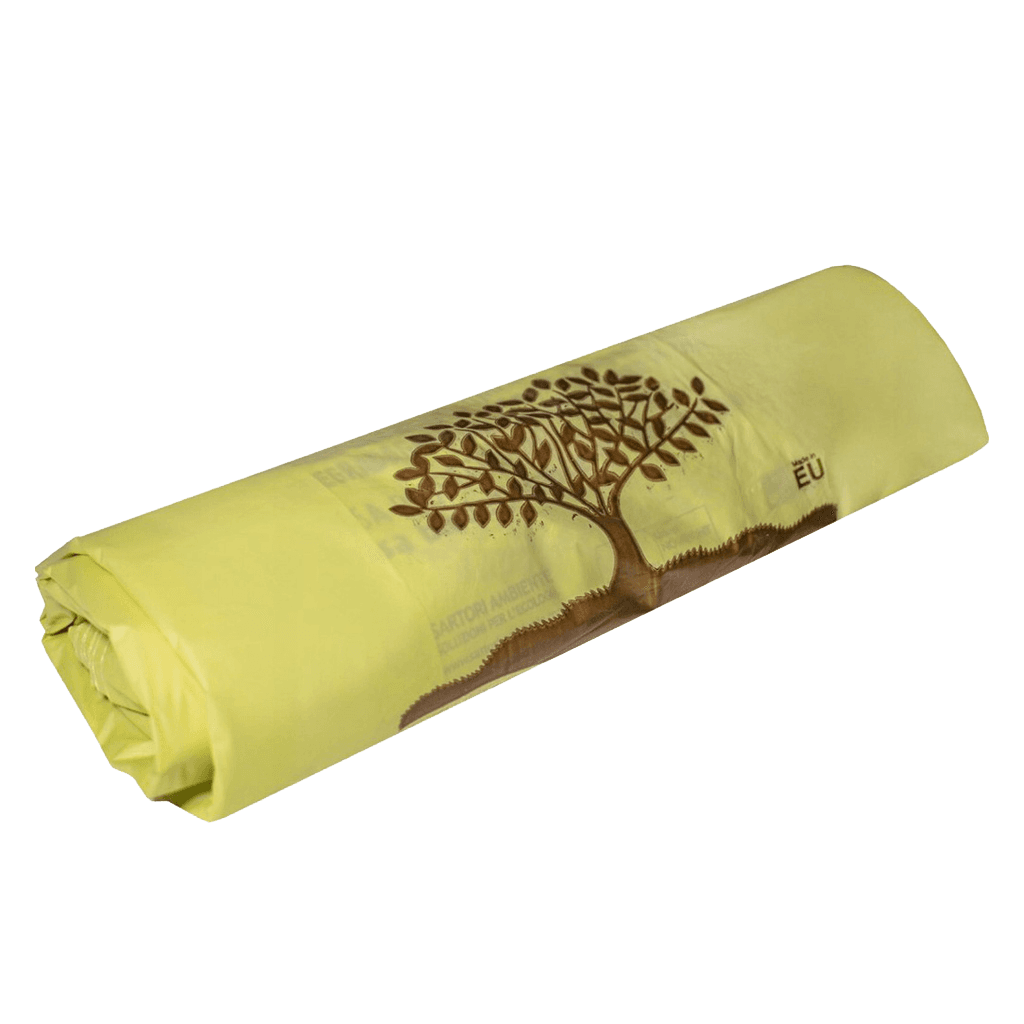
Frequently asked questions & answers
Why are you introducing kitchen waste collection?
The City of Bratislava is required to introduce the collection of kitchen waste from 1.1.2023. The city has decided to gradually involve the boroughs, as the introduction of kitchen waste collection is about creating a convenient system for the residents, which requires a longer time for implementation. In order to fulfil its obligation to introduce kitchen waste collection throughout its territory, the city needed to start the first phase now. Out of the 17 city districts, we started in Lamač.
Will the local charge for municipal waste and minor construction waste be increased?
No, the charge will not increase due to the collection of kitchen waste. The cost of collecting kitchen bio-waste from residential blocks and family houses forms part of the local charge for municipal waste and minor construction waste.
Why are you starting with the introduction of kitchen bio-waste collection in Lamač?
The district of Lamač was evaluated as a suitable district for starting implementation of the whole system within the framework of the study on kitchen waste. Lamač is an urban district that has a lower population density, there are family houses and apartment buildings (both large and small). So we can apply the collection in different variations and best see what works/doesn't work. Feedback from residents will therefore be very important to us.
When will other city districts join the kitchen bio-waste collection system?
- Phase: from October 2021 - Borough of Lamač
- Phase: (start of collection from April 2022) - Boroughs: Rača, Nové Mesto, Vajnory, Devínska Nová Ves, Záhorská Bystrica
- Phase: (start of collection from May 2022) - Boroughs: Ružinov, Podunajské Biskupice, Vrakuňa
- Phase: (start of collection from July 2022) - Boroughs: Devín, Dúbravka, Karlova Ves
- Phase: (start of collection from January 2023) - Boroughs: Staré Mesto, Petržalka, Čunovo, Jarovce, Rusovce
How can I get my bin and compostable bags?
Residents of family houses in Lamač could pick up the package (10 l kitchen bin, 20 l collection container, 150 times compostable bags and information leaflet) during the distribution according to the schedule, which took place from 20.9.2021.
Residents of residential blocks in Lamač could pick up the package (10 l kitchen bin, 150 compostable bags and information leaflet) during the distribution according to the schedule. Residents learned the date and time from a poster that was posted on the front door of the apartment building.
Residents of family homes will be notified of distribution times via text message. The timetable for the distribution of bins and door-to-door collection bins directly to households of family houses in Lamač was also published on the website www.olo.sk ↗︎.
Residents of residential blocks in Lamač were able to pick up the package during the door-to-door distribution directly to their homes. Residents learned the date and time from a poster that was posted on the front door of the residential block. If they did not manage to pick up their package during the door-to-door distribution, they could come and pick it up at the locations of the established distribution centres.
Where will I get more bags when my 12-month supply runs out? The first 150 are free, will I pay for the next 150? Should I pick them up somewhere?
Residents will receive 150 bags (approximately 2 to 3 bags per week) for a period of 12 months. Other certified compostable bags with the "OK compost" logo can be purchased by residents in shops.
What if I own multiple properties? Am I entitled to more bins with bags?
If the property is included in the municipal waste collection system within the territory of the capital city, it is entitled to a package. If there are multiple registered connections in one property, each connection is entitled to a package. The package for family homes includes a 10-litre kitchen bin, a 20-litre collection bin, 150 compostable bags and an information leaflet. The package for residential blocks includes a 10-litre kitchen bin, 150 compostable bags and an information leaflet.
Do I need any documentation when I pick up my bin?
Yes, if you are a taxpayer, you only need an ID card. If you are not the taxpayer, you must submit a power of attorney from the taxpayer (does not have to be notarised).
Can someone else pick up my bin for me? What will they need in order to do this?
If you are not the taxpayer, you must submit a power of attorney from the taxpayer (does not have to be notarised).
Do I qualify for a bin with bags if I own a recreational property in the district?
Yes, each property is separately involved in the municipal waste collection system within the territory of the capital city of Bratislava.
What if I have my own K-BRO (kitchen-biodegradable waste) collection bin/bucket?
You can also use your own K-BRO (kitchen-biodegradable waste) collection bin, but it is important that you use compostable bags to put your kitchen waste into the collection container.
How to combine kitchen bio-waste collection and home composting?
The two methods effectively complement each other to ensure that as much food waste as possible is recycled. Fruit and vegetable waste can be composted at home, as can flowers, wood chips, sawdust, cut grass, small pieces of branches, leaves and weeds. Attention! You can put meat, fish and dairy products along with any cooked food in your kitchen waste collection, but you should not compost them at home. An ordinary home composter sited in the garden cannot fully process them.
I have a garden and I compost everything; do I need a bin?
Anyone who composts knows that when composting it is important what waste you put into the composter, as this will affect the quality of the compost. Therefore, spoiled or mouldy food and food of animal origin (dairy products, bones, etc.) do not belong in the composter. This is the purpose of the kitchen waste collection, so that residents can also dispose of biodegradable waste that cannot be composted in a garden composter.
What is the difference between a collection container for kitchen bio-waste and garden bio-waste?
Residents of family houses and residential blocks will sort kitchen bio-waste into a compostable bag placed in a 10-litre kitchen bin.
Residents of residential blocks will place the filled sealed bag in a 120 litre or 240 litre collection container, which will be located near the residential block.
Residents of family houses will place the bag in a 20-litre collection container, which will be located in front of the house/residential block according to the schedule on the day for the scheduled collection of kitchen bio-waste. The collection of kitchen waste will take place throughout the year.
Garden bio-waste will continue to be collected seasonally from March to November, once every two weeks, as previously. Please do not dispose of kitchen bio-waste in the garden bio-waste bins. These types of waste are processed differently. The brown container for garden bio-waste and the brown container for kitchen bio-waste are distinguished by stickers.
Where can I find more information about kitchen waste collection?
- information leaflet which will be included in the distribution package ↗︎
- www.olo.sk ↗︎
- www.bratislava.sk ↗︎
- local media, such as Lamačan, in.ba, etc.
- social networks of OLO, Lamač Borough and the City of Bratislava
Won't my waste smell at home?
By putting the waste in a compostable, breathable bag, which is placed in a ventilated container, its moisture and biological processes are eliminated, thus preventing the formation of odours. Hence, the waste does not tend to rot or go mouldy. If you are putting food of animal origin (bones, meat scraps) in the bin, we recommend wrapping them in newsprint (not flyer paper!) beforehand to trap moisture and odours. We recommend disposing of foods with high moisture content (e.g. watermelon) in compostable bags in outdoor collection bins as soon as possible. Kitchen waste should be placed in a plastic bag and properly sealed, kept at room temperature, not exposed to the sun and kept in the dark.
Won't the containers smell? Is there no risk of insects, rodents?
The odour is already eliminated during household waste management. By putting the waste in a compostable, breathable bag, which is placed in a ventilated container, its moisture and biological processes are eliminated. Hence, the waste does not tend to rot or go mouldy. To avoid unpleasant odours in the home, early removal is recommended. You don't have to wait until your bag is full. Kitchen waste should be placed in a plastic bag and properly sealed, kept at room temperature, not exposed to the sun and kept in the dark.
Won't the waste leak?
Liquid food should not be disposed of in the kitchen biodegradable waste bins. For example, if you're going to throw away soup, we recommend straining it first, throwing the solid part in the kitchen biodegradable waste bin and the liquid part in the sink. You can dispose of foods such as yoghurt and cream in small amounts, but we do not recommend putting large quantities of such foods into the bags. If your bin should contain food that may increase humidity, we recommend lining the bin with a piece of cardboard to trap the moisture.
Where does the collected kitchen waste go and what will be done with it?
Well-sorted kitchen biodegradable waste is a useful and valuable material, but it needs to be further processed. From August 2022, Zdroje Zeme a.s. is the end device for processing this material. the Horný Jatov operation, which won the public procurement, website: www.zdrojezeme.eu ↗︎.
The output of the processing of biodegradable kitchen waste is a certified EFFECO substrate. It is a substrate capable of sequestering carbon, nourishing the soil and increasing its fertility. The result of composting kitchen biowaste from Bratislava households is a product that can restore natural resources and life in the earth.
In 2024, the city of Bratislava plans to build its own facility for the recovery of kitchen bio-waste, which will help us manage this type of waste efficiently and ecologically.